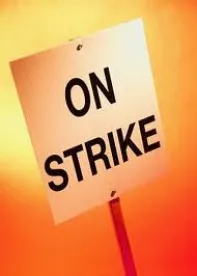Work stoppages and disruption of operations are consequences of the Coronavirus Disease 2019 (COVID-19) pandemic. This GT Alert provides an overview of federal law regarding employee protections associated with work stoppages that protest safety in the workplace.
Federal Laws That Protect Employees Who Stop Work or Interfere with Operations
No less than three1 different federal laws and/or regulations may protect employees who stop work because of or related to the COVID-19 pandemic: (1) Section 7 of the National Labor Relations Act (NLRA); (2) Section 502 of the Labor Management Relations Act (LMRA); and (3) the Occupational Safety and Health Act’s regulations, specifically 29 C.F.R. § 1977.12.
1. NLRA
Section 7 of the NLRA gives non-supervisory employees in unionized and non-unionized settings the right to act in a concerted protected manner, including a strike or work stoppage, because of: (1) a labor dispute that concerns employee demands over safety and other terms like hazard wages, flexible hours, safety policies, and practices during a pandemic or other conditions of employment or; (2) an employer’s unfair labor practice(s) (ULP Strike), such as retaliation or discrimination against employees who protest over safety. Section 7 “protects the rights of employees to strike over what they honestly believe to be unsafe and unhealthy working conditions.” Tamara Foods, Inc., 258 NLRB 1307, 1307 (1981). The National Labor Relations Board (NLRB) has long held that Section 7 protects employees who bring to management’s attention “truly group complaints” of an employer’s violation of state or federal workplace safety laws. See, e.g. Meyers Indus., 281 NLRB 882, 887 (1986). It is likely the Board will conclude Section 7 similarly protects employees’ concerted refusals to work in protest of an employer’s perceived violations of state or local shelter-in-place or social distancing restrictions.
And note Section 7 may also protect sympathy strikers—individuals who stop working in sympathy for their striking co-workers, even though they do not personally have a labor dispute with their employer. Section 7 does not protect significant misconduct during a strike (e.g., violence and property destruction or sabotage), partial or intermittent strikes, or sit-ins.
2. LMRA
Turning to Section 502 of the LMRA, it too protects employees who, in good faith, stop work because of abnormally dangerous working conditions. But work stoppages under Sections 502 and 7 differ in several respects. First, unlike Section 7, Section 502 protects even one employee from stopping work because of abnormally dangerous conditions. The activity does not need to be concerted. Second, Section 502 imposes a heavier burden on employees to establish dangerous conditions. Under Section 502, an employee “must present ascertainable, objective evidence supporting …[a] conclusion that an abnormally dangerous condition for work exists.” Gateway Coal Co. v. Mine Workers, 414 U.S. 368, 387 (1974); See also TNS, Inc., 329 NLRB 602 (1999) (noting that to be protected by section 502, employees “must demonstrate by a preponderance of the evidence that [they] believed in good-faith that their working conditions were abnormally dangerous; that their belief was a contributing cause of the work stoppage; that [their] belief is supported by ascertainable, objective evidence; and that the perceived danger posed an immediate threat of harm to employee health or safety.”) (vacated on other grounds by TNS, Inc. v. N.L.R.B., 296 F.3d 384, 393 (6th Cir. 2002)). Third, no-strike provisions in collective bargaining agreements may not prevent Section 502 work stoppages. Gateway Coal, 414 U.S. at 385 (“This section provides a limited exception to an express or implied no-strike obligation” thereby insulating participants from injunctions, liability for damages, or termination when a cessation of work is necessary “to protect employees from immediate danger.”).
3. OSHA (29 CFR § 1977.12)
OSHA also protects even one employee from stopping work because of abnormally dangerous conditions. The activity does not need to be concerted. Employees have a right to refuse to work where there is a risk of death or serious physical harm if all of the following conditions apply: (1) the employee has asked the employer to eliminate a danger, and the employer failed to do so; (2) the employee refused to work in “good faith” (this means the employee must genuinely believe an imminent danger exists); (3) a reasonable person would agree there is a real danger of death or serious injury; and (4) due to the urgency of the hazard there is not enough time to correct it through regular enforcement channels, such as requesting an OSHA inspection.
Employer Options for Responding To Work Stoppages
Given each situation is different, employers should carefully review the facts before disciplining or terminating an employee who refuses to work out of COVID-19 concerns. For instance, although Section 7 of the NLRA may protect employees’ concerted refusal to work based on an honest belief of dangerous working conditions, the same facts may or may not protect a single employees’ refusal to work under OSHA or LMRA Section 502.
Conclusion
Although COVID-19 may or may not present an “abnormally dangerous” working condition under section 502, or an imminent danger under the OSHA, the NLRA may still protect concerted work stoppages. In addition, state and local laws may also afford employees protection. Employers should consult legal counsel for specific guidance on how to respond to work stoppages or other interferences with operations as employees express concern about the pandemic in the work place.
1 Employees subject to the Railway Labor Act (RLA) (including railroad and air carrier employees) may have different rights related to work stoppages under the RLA.




 />i
/>i

